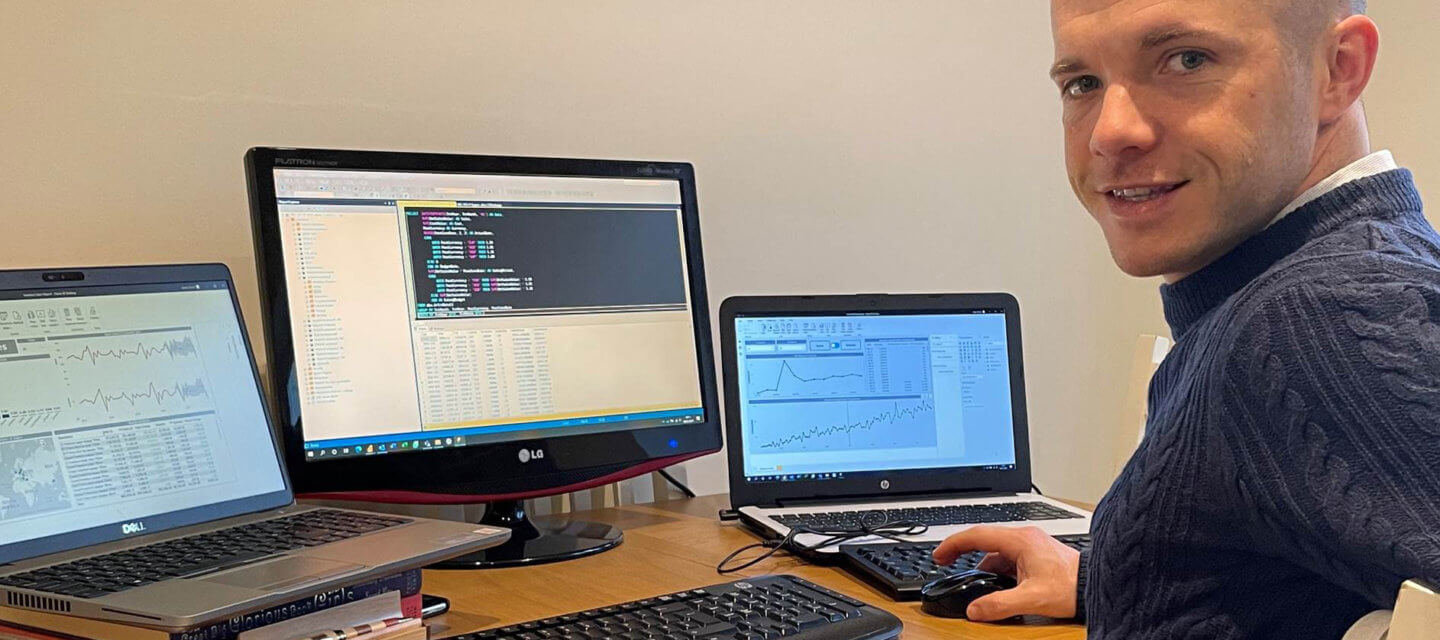
A data analyst on the team
In September, Welland Medical welcomed a full-time data analyst, James Trout, to the team. James’ first data analytics role was down to his knowledge of football rather than his proven skill with data, yet in just three months, he’s turned those data skills to good use across all our departments. James spoke to us about his career journey and his experience with data in the stoma care industry to date.
What has your day-to-day job as a data analyst at Welland entailed so far?
“When I started with Welland I knew very little about the business. My mum was a nurse, but I had limited knowledge of the stoma products and appliances we manufacture when I started.
“For me, the most important thing is feeling a connection to the data I work with, whatever it is. I need to understand what’s behind the numbers so that they have meaning to me. My first week at Welland I met with every team manager – marketing, sales, engineering, operations, finance – and I had a tour of the factory. So, when it came to looking at the data I straight-away knew what I was looking at. I wasn’t just staring at a screen of numbers.
“Since I started, I’ve worked on engineering data and finance data and done sales and marketing analyses. I’ve been working with different teams across the company. Some projects have taken weeks, and some have taken 10 minutes. It depends on what people need. I’ve been familiarising myself with Power BI and SYSPRO, which I hadn’t used in my previous job.
“Although I’m essentially in a team of one at the moment, I get a lot of satisfaction from producing results for a particular team. Feeling I’ve helped them out and been part of their team effort.”
You haven’t taken a conventional route into data analytics. Can you tell us about how your career developed?
“Before joining Welland, I worked in football analysis. I was the only person on the team without a degree in maths or statistics or similar. I went for the interview because the job sounded interesting, but I didn’t expect to get it. The reason I did get it was my knowledge and love of football, rather than any proven numerical abilities!
“I’ve always been interested in and enjoyed numbers though, and I did well in my maths and IT GCSEs. But then I made my A-level decisions based on the career in football that I thought I would have. Things didn’t work out as I’d planned, and I worked for a while in hospitality. Then I saw this football analytics job advertised in 2014.
“After working there for a few years, I decided to do my degree through The Open University, which I did. Although I could probably still be doing my job without the degree, because I’m motivated to learn and good at teaching myself new things, it was about giving myself the confidence to go for jobs in different industries. Also, everyone else had a degree, so felt I was behind a bit. I’m glad I did it.”
What drew you to the role here at Welland?
“It felt like a good new challenge and an opportunity to build new capabilities at Welland. I like working independently and in this role I get to do that and have the satisfaction of working as part of all the teams too. I also knew it would give me the chance to learn new programs, and to work across all aspects of a business”.
Do you have a particular ethos that guides how you approach your work?
“I love to achieve something every day, but I believe that success isn’t a destination, it’s a journey. You can always learn, there’s always room for improvement. The world keeps moving on, so we need to keep learning too.”
What qualifications and personality traits do you feel are essential for someone wanting to work as a data analyst? “As I said, I didn’t have a degree when I started, but I do think it can be important for certain roles. You do need some kind of numeric background and to enjoy numbers.
“Programming skills are also important. I’ve taught myself Python programming language and I use SQL all the time. Machine learning is the next thing I want to get into. You’ve definitely got to be on your toes and enjoy learning new things when it comes to data. It can be intense because you can be faced with huge databases with millions of records nowadays.
“You also need to be practical and enjoy problem-solving. As a kid I loved puzzle books and crosswords. I love working things out and figuring out solutions. And you need to be open-minded. Often with data analytics you are asked to prove a hypothesis and you need open-mindedness to see what the numbers are really telling you.”

